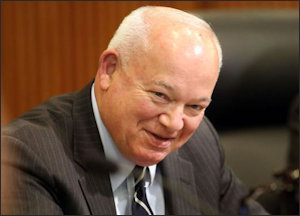
Paul Fraim. Photo credit: Virginian-Pilot
The Slover Literary Foundation, a tax-exempt charity set up to support Norfolk’s flagship Slover Library, plans to spend more on salaries next year than on direct aid to the library, the Virginian-Pilot reports today.
The Slover foundation will spend almost 60% of its fiscal 2018 budget on administrative costs including a $150,000 salary for former Norfolk Mayor Paul Fraim, according to figures Fraim provided the Pilot. The highest-rated charities on Charity Navigator tend to spend 10% or less on administration, the newspaper notes.
Foundation board members argue that the salary paid to the 67-year-old Fraim is worth it. The former mayor brings a vast network of relationships to the foundation and can make things happen. His skills and connections have helped bring high-profile events to the library such as a NATO panel and a “future of the Navy symposium as well as guest speakers, music, and youth programs.
Slover is one of 13 public libraries in Norfolk. The city has tried to make it a cultural destination with technology, architecture and events.
Bacon’s bottom line: Read the Pilot article on the pros and cons of paying Fraim a $150,000 salary. I can see both sides of the story. But I’m mainly interested in a different point: Whether the salary is justified or not, transparency is vital. If a charity or non-profit benefits from tax-exempt status, it owes an obligation to the public. Tax exemptions, after all, are an indirect subsidy from taxpayers.
Most charities report this data in 990 forms. But The Slover foundation did not release the data for four years. Reports Eric Hartley:
Until now, it had been difficult for donors or other outsiders to evaluate the Slover foundation’s spending. Founded in 2008 to raise money to build a downtown library, the organization did not make its finances public between 2013 and this year. Its outside accountants said it was not required to, unlike most charities, because it was a “supporting organization” to the city government.
The justification for not releasing the financial information is specious. If anything, its affiliation with the City of Norfolk means it should be held to the same Freedom of Information Act standards as Virginia government! Who could be blamed for suspecting that Fraim avoided so long releasing the information to avoid embarrassment of having it appear in the Pilot?
There’s a bigger point here: the lack of accountability of non-profit organizations generally. Nonprofits are required to basic financial information in 990 forms. But non-profits have minimal government regulatory oversight. They have no shareholders to answer to. They receive little press scrutiny. (The Pilot’s coverage of Slover is a rarity). And boards of directors are typically clubby conclaves of well-heeled members of the business and political elite who don’t want to rock the boat.
I’m reminded of a recent column by Walter Williams, an economics professor at George Mason University, who wrote of university trustees:
Every board of trustees has fiduciary responsibility for the governance of a university, shaping its broad policies. Unfortunately, most trustees are wealthy businessmen who are busy and aren’t interested in spending time on university matters. They become trustees for the prestige it brings, and as such, they are little more than yes men for the university president and provost.
The same critique extends to many government boards and nonprofit boards. There are always exceptions — in my coverage, I’ve seen a few individuals willing to ask tough questions — but they are rare. I sometimes wonder if the best way I could “give back” to the community when I retire is to convert Bacon’s Rebellion into a platform for covering governance of Virginia’s foundations, charities, universities and health systems. I’d be interested to know what readers think of the idea.


